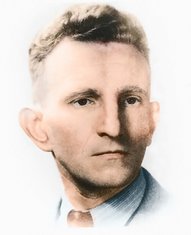 Ukraine’s policy of celebrating its nationalist ‘heroes’ continues, with plans to rename a main Kiev street after Roman Shukhevych, a Ukrainian paramilitary leader responsible for the massacre of tens of thousands of Poles and Jews. The city council passed the decision on 1 June with 69 of 120 members voting in favour. The street was previously named after Red Army general Nikolai Vatutin, who had been involved in liberating Kiev from the Nazis. Hundreds of citizens gathered in front of the statue of Valutin in the centre of Kiev, many of them World War II veterans, shouting “Shame”. Violence broke out after the demonstrators were attacked by ultra-nationalists and 20 people were injured. Shukhevych (see photo) was a Ukrainian politician and paramilitary leader, who headed the Ukrainian Insurgent Army during and after World War II. The nationalist militant organisation was for a time allied to Nazi Germany and was responsible for the mass slaughter of Poles and Jews. The proposed street-name change is the latest in a line of events in which Ukraine has honoured controversial nationalist heroes. In 2015 the country even passed a law celebrating Shukhevych’s Ukrainian Insurgent Army and its parent organisation, the Organisation of Ukrainian Nationalists. Streets elsewhere in the country have been named after the group and its leaders. Ukraine’s Institute of National Memory is drafting a law to posthumously exonerate members of both organisations who were convicted of murdering Polish and Jewish civilians during and after the war. In October 2009, then-president Viktor Yushchenko honoured Shukhevych with the title Hero of Ukraine. In Lvov, a festival celebrating Shukhevych, featuring music and theatre, is due to be held today, on the anniversary of a major pogrom against the city’s Jewish population. On 30 June 1941, Ukrainian troops, including militias loyal to Shukhevych, initiated a series of anti-Semitic attacks under the auspices of the German army, in which up to 6,000 Jews were murdered. Shukhevychfest also marks the 110th birthday of the nationalist leader. Edward Dolinksy, one of the leaders of Ukraine’s Jewish community, called the street-name change “a case of moral decline, cynicism and contempt for humanity”. “This is a day of national shame,” he said. Kiev’s regional court has issued an interim injunction temporarily prohibiting the name change, following an appeal by the Jewish community. Many Ukrainians view the country’s wartime nationalist leaders as heroes in the fight for an independent Ukraine. But their veneration has coincided with a growing number of anti-Semitic incidents in Ukraine – see my blog post dated 5 May and 3 March. Kiev’s mayor, Vitali Klitschko, whose grandmother was Jewish, has come under pressure to veto the city council’s decision, but has failed to intervene, even though he reportedly is not in favour of the move. Ukraine’s Jewish prime minister, Petro Poroshenko, has remained silent on the issue. Poroshenko was in Washington last week for a meeting with President Donald Trump for talks on security, political and economic issues. The Ukrainian leader emerged from the meeting saying Kiev had “received strong support from the US side” over sovereignty, territorial integrity and the “independence of our state”. But Trump failed to speak out about Ukraine’s troubling glorification of Nazi collaborators. The President has faced accusations at home that he is soft on anti-Semitism and has not taken steps to distance himself from neo-Nazi groups that supported his election campaign.
0 Comments
Leave a Reply. |
Keeping stories aliveThis blog aims to discuss historical events relating to the Jewish communities of Ukraine, and of Eastern Europe more widely. As a storyteller, I hope to keep alive stories of the past and remember those who told or experienced them. Like so many others, I am deeply troubled by the war in Ukraine and for the foreseeable future, most articles published here will focus on the war, with an emphasis on parallels with other tumultuous periods in Ukraine's tragic history. Archives
March 2024
Categories
All
|
 RSS Feed
RSS Feed
